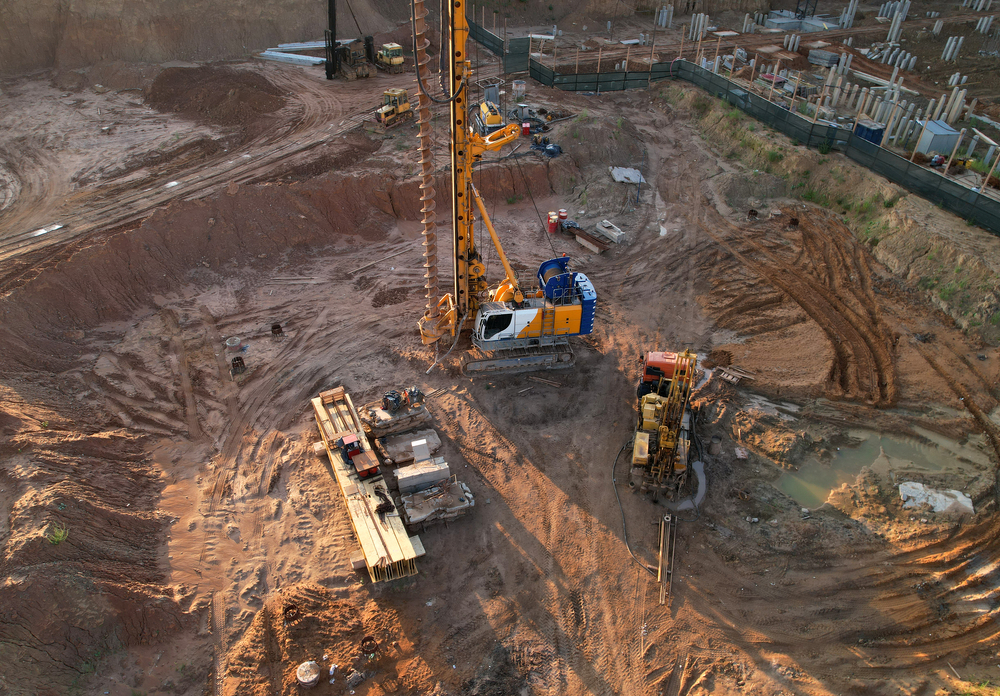How Geotheta can Save You Time, Stress, and Money.
How Geotheta can Save You Time, Stress, and Money.
Blog Article
The smart Trick of Geotheta That Nobody is Discussing
Table of ContentsIndicators on Geotheta You Should KnowGetting My Geotheta To WorkSome Known Incorrect Statements About Geotheta Getting The Geotheta To Work
They team up with civil engineers, structural engineers, designers, and various other specialists to integrate geotechnical considerations right into the overall job style and building process. This needs reliable synergy, coordination, and interaction to guarantee that the geotechnical facets straighten with the task objectives and satisfy governing requirements.Mining & Materials Engineering: Principles of boring, penetration prices, and aspects influencing the choice of drilling approach. Attributes of dynamites, shooting systems and blast patterns. Blasting methods in surface and below ground functions. Unique blowing up methods at excavation perimeters. Resonance and noise control. Mechanical and constant methods to fragmentation, consisting of longwall shearing and fullface boring.
Modelling of piece and particle size distributions; comminution as a transfer feature. Comminution modern technology: crushing, grinding, dimension category. Integrated evaluation of fragmentation and comminution procedures. Supplied by: Mining & Materials Engineering.
How Geotheta can Save You Time, Stress, and Money.
Bachelor's level programs in civil, geotechnical, geological, and ecological design usually last 4 years and consist of basic education and learning training courses in English, social scientific research, and the liberal arts, in addition to courses in sophisticated mathematics, architectural geology, and liquid mineralogy. (https://geotheta.bandcamp.com/album/geotheta)
Geotechnical design includes the analysis of the dirt and rock problems at a certain site, and their ramifications for the development of that site. As a lot of frameworks depend on the ground for support, it is without shock that a detailed understanding of the ground conditions, and the viability of foundation systems, are vital to the long-lasting stability and efficiency of the structure or structure.
Specialising in the investigation of geological developments and ground practices, geotechnical engineers carry out scientific investigations and testing to understand the effect these geological developments may carry the layout and construction of building, civil and framework tasks. This proficiency is vital for the layout and construction of buildings, roads, tunnels, dams, bridges, and water supply and sewage systems.
The geotechnical team at Douglas Partners routinely speak with architects, layout engineers, programmers, and home builders to make referrals on layout and growth proposals to make certain that the built structures are suitably developed for the ground problems. For instance, the design of footing systems needs to consider the weight of the structure, the capability of the ground to support that weight together with activity resistances and reliable construction.
Not known Details About Geotheta
This task is considerably simplified by the use our Douglas Map geospatial system that makes this information easily available in an easy to make use of web internet browser interface. A geotechnical designer will route the boring of boreholes and test pits to accumulate soil and various other examples, and additionally analyze surface attributes and ground exposures to develop a geotechnical version of the subsurface conditions.
Relying on the project type and ground problems came across, laboratory screening may amongst other things analyze toughness, compressibility, sensitivity and/or permeability of soil and rock examples. Hereafter information is gathered and collected, the results are made use of for a geotechnical design of the website, which is typically offered as areas across the website.

A geotechnical article examination naturally can just examine the ground problems at the places drilled or dug deep into. All-natural variations in soil and rock conditions can take place throughout a website and between test places. It is for that reason good technique that the geotechnical engineer be maintained throughout construction of the task to supply on-site verification that the ground problems run into are consistent with the assumptions and recommendations provided in the geotechnical examination report.
The 15-Second Trick For Geotheta
Geotechnical designers utilize their thorough understanding of dirt and rock to examine threat and solve problems on diverse facilities projectsGeotechnical design is a specialist branch of civil engineering which takes a look at the behavior of planet products and the application of soil and rock auto mechanics. Engineer of Record. As a geotechnical engineer, you will analyze the physical, mechanical and chemical residential or commercial properties of soil and rock in order to create foundations, maintaining structures and earthworks
Geotechnical engineering is very closely connected to and overlaps with, both engineering geology and ground design - https://www.evernote.com/shard/s342/sh/0ddde0a2-417b-669e-3d11-8f53bf2073ba/dxCfPcosgpFcDl9WAXonEVeNbxWt1i_y0aMcgTcK_KXcXyxfIS3apQYAgA. It's possible to be experts in geotechnics or benefit a geotechnical firm but be called an engineering rock hound or a ground designer. As a geotechnical designer, you'll need to: construct and preserve relationships with clients and other experts associated with the site, throughout each projectmaintain safety and security standards on site bear in mind price effects when you make recommendationsstudy geological maps and aerial photos from a series of sources and from different time periodsexamine construction prepares to see just how viable they are based on your understanding of the siteinvestigate dangers or geological hazards for the sitesearch for environmentally delicate functions, such as landfill beginning to create factual and interpretive ground modelsplan field investigationsdrill and analyse samples of bedrock, soil, groundwater and added products supervise various other professionals on sitesolve technical problems as they develop, such as unexpected structures at drill sitesmonitor conditions throughout and after construction to make sure structures are secure in the brief and long termadding data gathered on site to your preliminary researchcreating geotechnical computations, drawings, and 2 or three-dimensional computer system models interpreting the datamaking referrals concerning the proposed use of the website

Report this page